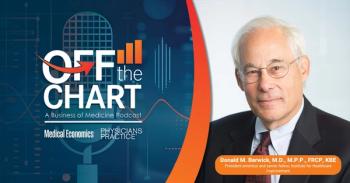
Small Practice Bears Larger Load for Healthcare Costs
Rising patient deductibles and cost sharing not only hurts patients, but also can put pressures on medical practices to manage their revenue cycle.
Pediatrician Terence McAllister and his spouse, administrative director Leann DiDomenico McAllister, MBA, are co-owners of Performance Pediatrics, a pediatric micropractice based in Plymouth, Mass. Physicians Practice recently spoke with the McAllisters on their experiences and thoughts on the rising cost of healthcare as part of our reporting on the Great American Physician Survey.
Physicians Practice: Are you feeling the effects of high-deductible health plans (HDHPs) in your practice?
Terence McAllister, MD: Yes we are certainly feeling that in our own practice,
as far as the drop off that we've seen in [patient] appointments for chronic care [is concerned]. From the other perspective, from the fact that we own the business here and provide health benefits to ourselves and our employees, we are providing a HDHP to our employees and ourselves. And so we certainly feel the effects of it from both sides.
Leann DiDomenico McAllister: I think the biggest increase in expenses over the past five years have been two things: technology and health benefits. And really nothing else compares to the rising costs of those two t
hings. It's very frustrating when I know I'm paying 30 percent more for our commercial HDHPs than I was even two years ago. And yet fee reimbursements from those same plans have not increased in the same numbers.
PP: Are you altering your prescribing practices to accommodate inflated drug prices, for example, Mylan's EpiPen?
TM: [In that instance] I'm not altering my prescribing practices, because [Mylan is] a monopoly. There really is no option, these kids need it. … In the past some families have asked to have a backup pen available, or one they keep in their car, one they keep with them, as well as in school. So they are not doing that as much anymore. They just have the one at home that they have to remember to bring with them all the time. That certainly is a little of a safety concern, not being redundant [like] in the past, by having that many. It affects us here in the office. I have an emergency response kit and I don't keep an EpiPen in it anymore. I keep epinephrine and a syringe. So that would slow things here in the event of an emergency, but I've had to use it once in the 10 years we've been open.
PP: Are your patients less reliant on medications because they are children?
TM: Most of our patients aren't on many medications. Kids with asthma or attention deficit hyperactivity disorder (ADHD) are on chronic medications, but you are right most pediatric patients are not on many medications. So prescriptions are not as much a burden on my patients as they would be in an adult practice.
LDM: The point I want to make is, in a pediatric practice, most of the kids don't need these meds, most don't need chronic appointments, it's only a very small fraction that have these high costs associated with the HDHPs because they have these needs. And while I understand that the theory behind the HDHPs is to stop people from over-utilizing [care] unnecessarily, from our perspective, that's not a problem. I mean really the people who have to use us more than their peers are just unlucky. And it's punishing the unlucky to make them pay more into the healthcare system.
PP: What are some of the things that patients can do to help reduce their healthcare costs?
TM: That's a good question. I don't know if there is a lot that people can do. A lot of this extra cost comes from being unlucky. You get an illness or have an accident or something like that, and then your deductible kicks in - there's nothing you can do to avoid that. Getting appropriate preventative care I think certainly does help in the long run to help minimize the risk of those chronic conditions or those accidents. Other than that, the best thing anyone can do is to advocate for a better system. Leann and I are both very strong advocates for a single payer system. And I think by pushing politicians toward that, taking the profit out of the health insurance part of the healthcare industry, as well as helping with a single payer, there could be better negotiations for pharmaceuticals. I think in the long run that's going to help bring costs down, much better than the system we have.
PP: What are you doing in your practice to control costs?
LDM: We had a nurse practitioner (NP) for three years, and we had another one here for a year and a half, and she left us for a shorter commute. But now we are replacing her with a [licensed practical nurse], not a NP. We can't justify having a mid-level with the reimbursements that we are seeing, but we still need telephone triage care and care coordination and all those things. So we are making changes like that. For the 10 years that we've been open, Terence has always seen 10 to 15 patients a day. We are toying with the idea of bumping that up because we need to bring in more volume to keep us fiscally solvent. So the cost to our patients is those 45-minute well exams that they love with Dr. McAllister might get a little bit shorter. And I think too that the other part of cost is the cost to the front-desk staff. Patients have always complained to the front-desk staff, but it's more than we've ever seen before. Its money that they have to pay, they are upset about the EpiPen ... And again we are lucky that our model supports the front desk lending an ear. The front desk really has time to comfort and listen to the complaints of the parents. But I don't think that happens in a lot of practices - they have a long line of people that they have to check in and they don't really have the time to let someone offload.
Be on the lookout for the Great American Physician Survey report, with complete results to the survey and much more. Coming soon!
Newsletter
Optimize your practice with the Physicians Practice newsletter, offering management pearls, leadership tips, and business strategies tailored for practice administrators and physicians of any specialty.




